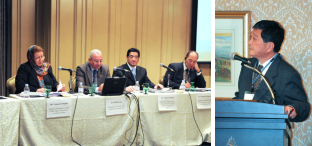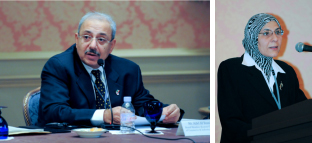6 December (Sun) −Welcome Reception & Signing Ceremony
A Memorandum of Cooperation (MOC) signing ceremony was held at the Iikura Guest House to mark the establishment of the Forum, prior to the welcome reception jointly hosted by the Minister for Foreign Affairs and the Minister of Economy, Trade and Industry. The MOC was signed by H.E. Mr. Amre Moussa, Secretary General of the League of Arab States (LAS), on the Arab side, and by Japanese Minister for Foreign Affairs Katsuya Okada and Japanese Minister of Economy, Trade and Industry Masayuki Naoshima on the Japanese side.
7 December (Mon) −Ministerial Meeting
<Opening Session>
At the opening ceremony, opening speeches were given by H.E. Mr. Okada, H.E. Mr. Naoshima, H.E. Mr. Moussa, Mr. Fujio Mitarai, Nippon Keidanren Chairman, and H.E. Mr. Safa al–Din al–Safi, Head of the Economic and Social Council of the LAS. H.E. Mr. Okada expressed his expectations of the Forum, saying that he hopes the Forum will strengthen ties between Japan and the Arab countries in ways that would benefit both sides in a wide range of areas that includes human resource development, the environment, and science and technology, and contribute not only to economic growth in Japan and the Arab countries but also to the sustainable development of the global economy as a whole. H.E. Mr. Naoshima focused on the significance of deepening economic relations between Japan and the Arab countries, and proposed to hold a water policy dialogue as part of the effort to promote dialogues and the implementation of diverse cooperation projects with the Arab countries. He also articulated his hopes that the Forum will invigorate business in various sectors, such as the alternative energy, environment, and financial sectors, and further enhance the cooperative relationship between the two regions.



<Keynote Speech and Discussion>
Three discussion sessions were held following the opening ceremony.
- Session 1: Human Relations
- Mr. Koichi Takemasa, Japanese State Secretary for Foreign Affairs, presided over the Session.


- Session 2: Energy, Water and Future
- H.E. Dr. Abdulaziz A. Bin Almas Turkistani, Ambassador of the Kingdom of Saudi Arabia to Japan, presided over the Session.



- Session 3: Trade and Investment
- Mr. Teruhiko Mashiko, Japanese Senior Vice Minister of Economy, Trade and Industry, presided over the Session.





Under each theme, active discussions were held on a wide range of topics including education, human resource development, energy, environment, science and technology, trade, and investment.
<Closing Session>
On behalf of Nippon Keidanren (Japan Business Fedeartion), Mr. Fumiaki Watari, Vice Chairman of Nippon Keidanren (Chairman of the Committee on the Middle East and North Africa) made a presentation on a vision for strengthening for economic ties with Arab nations. And H.E. Mr. Naoshima presented the Chairman's Summary statement of the discussions.

<Press Conference>
A press conference was held with the participation of H.E. Mr. Naoshima, H.E. Mr. Moussa, representatives of Arab countries and speakers of the three discussion sessions.

<Reception hosted by JCCME>

8 December (Tue) −Business Meeting−
<Opening Session>
Mr. Iwao Okamoto, President, JCCME, gave an opening speech representing the Japanese side, and H.E. Mr. Safa al-Din al-Safi, Head of the Economic and Social Council, LAS, representing the Arab side. The two leaders noted that business exchanges led by the private sector are indispensable to strengthening economic relations between Japan and the Arab countries, and expressed their expectations that the day’s business meetings would provide new and concrete business opportunities for both sides.


<Sectoral Workshop>
Private sector companies took a leadership role in implementing the program on the 8th, which consisted of sectoral workshops on such themes as finance, water business, solar energy, and industry/trade/environment/tourism. Participants on the Arab side gave presentations on business environment and opportunities. Below is the summary of each workshop.
- 1. Financing for Investment
- The Japanese side emphasized the significance of extending active financial support to Japanese companies which would be involved in energy and infrastructure projects in the Arab countries. It also explained the benefits of investing in Japan and expressed hopes for medium to long-term investment particularly in Japan’s real estate sector. The Arab side explained that it is making active investments in the oil and infrastructure sectors, and also spoke about the strengths of the securities market and about reforms that are being made in the finance sector. On the whole, it expressed expectations of promoting partnerships with Japan.


- 2. Water Business
- Dr. Mahmoud Abu-Zeid, Chairman of the Arab Water Council and Former Minister of Irrigation and Water Resources, Egypt, proposed to hold a seminar within the next few months to exchange information on main themes related to water businesses, and to create a water business network and follow-up system. Mr. Toshihiro Mitsuhashi, Director of the Water Industry and Infrastructure Systems Promotion Office, Manufacturing Industries Bureau, Ministry of Economy, Trade and Industry, articulated his wish to engage in deeper discussions with the Arab countries through a Japanese water delegation to be dispatched by Japan Cooperation Center for the Middle East.


- 3. Solar Power Systems
- The Middle East region has strong interest in solar power generation, because it has a distinct advantage in terms of sunlight hours, and because transmission lines exist throughout the region and reach as far as the North African countries and Europe. Morocco is currently implementing a large-scale solar power project, and Algeria and Egypt are considering the introduction of large-scale solar power generation facilities. Based on this awareness, Japanese manufacturers of solar power systems appealed to the Arab side by emphasizing the high conversion efficiency of their systems and other advantages of Japanese solar power technologies.


- 4. Industry / Trade / Environment / Tourism
- Ambassadors from countries in the Middle East and North Africa to Japan introduced the speakers from their respective countries. The speakers addressed an audience which included cabinet ministers, and gave a presentation on a theme their country wishes to call attention to, from among themes related to industries, trade, the environment, and tourism.


<Seminar on Current Japanese Businesses>
The Japanese side gave presentations related to Japans competitive sectors such as plant factories, scientific research and technology, SMEs, plant engineering, the content industry, and intellectual property rights. Below is summary of the presentations.


- 1. Plant Factories: Marubeni Corporation, Mirai Co., Ltd., Espec Mic Corp., Mitsubishi Chemical Corporation, Nihon Advanced Agri Corporation
- The above companies proposed a plant factory that would provide a clean and eco-friendly growing environment based on advanced technologies and would allow safe quality vegetables to be made regardless of the seasons. In addition to a completely closed type of plant that utilizes artificial light and a type of plant that complements sunlight, they also introduced a simplified plant with modules mounted on a container. As the major challenges of such plants are cost and productivity improvement, a brief outline was given of a subsidy system that the Japanese government is providing with the aim of reducing costs by 30% over the next three years.
- 2. Scientific Research & Technology: Waseda Incubation Center
- Waseda University is top class in the field of entrepreneur incubation among other universities in Japan, and has produced many famous entrepreneurs to date. It introduced success cases in which the university supported business start-ups in the ASEAN region by groups of five to ten members and helped those businesses yield a profit at an early stage through the use of microfinancing and other such means.
- 3. Entrepreneur / SMEs: Junior Chamber International Japan, Small and Medium Enterprise Agency
- The Junior Chamber International Japan presented its view that junior chambers could utilize their worldwide network to contribute to promoting mutual understanding of SMEs between the Middle East countries and Japan.
The Small and Medium Enterprise Agency introduced its initiatives for the growth and development of small and medium enterprises. - 4.IT/ Plant Engineering Business: Panasonic Corporation, JGC Corporation, Yokokawa Electric Corporation
- Panasonic explained that eco-consciousness underlies it corporate activities, and that it is aiming to create eco houses through the development of energy-saving home appliances, LED lighting, water-saving toilet systems, and other such eco-friendly products.
JGC noted that it is making active business investments in such projects as IWPP, while at the same time it is aiming to serve as a bridge between Japan and the Arab countries in the area of human resource development by establishing and localizing an engineering company in the Middle East region.
Yokokawa explained that the three main pillars of its business are measurement, control, and information, and outlined its policies for creating partnerships with customers not only with a focus on system installation, but also on the provision of services after installation. - 5. Content Industry (Entertainment Industry): Index Holdings, Toppan Printing Co., Ltd.
- Index engages mainly in the mobile contents and entertainment businesses. This past February, it established a business center in Riyadh, Saudi Arabia, and is aiming to expand the contents, data services, and online game industries as promising industries in the region. Toppan Printing proposed businesses in preserving cultural properties utilizing its unique virtual reality technologies, and expressed strong interest in contributing to intercultural dialogues by introducing cultural properties in the Arab and neighboring regions by converting them to virtual reality.
- 6. Intellectual Property Rights and Anti-Counterfeit Enforcement: Japan Patent Office
- Every year, 500 billion Euros’ worth of counterfeit goods are distributed throughout the world’s markets. The majority are made in China, and many are sold in the Middle East region. In order to eradicate counterfeit goods, the Japan Patent Office explained that it is necessary to strengthen the intellectual property system and the penalty system, and to cooperate with foreign governments.
9 December (Wed) − Site Visit−
Pre−registered participants toured a number of facilities relevant to the themes discussed in the Forum such as water (Shibaura Water Reclamation Center), scientific research and technology (Waseda University & Panasonic Center Tokyo) and energy (Shiodome Urban Energy Corporation).
Others Events
<One−to−One Business Meeting>

<Exhibition>
A business fair (exhibition) organized by JETRO was held at the same venue throughout the duration of the Forum, displaying information provided by the embassies of Arab countries in Japan, as well as by Japanese economic organizations, private companies, and universities.
